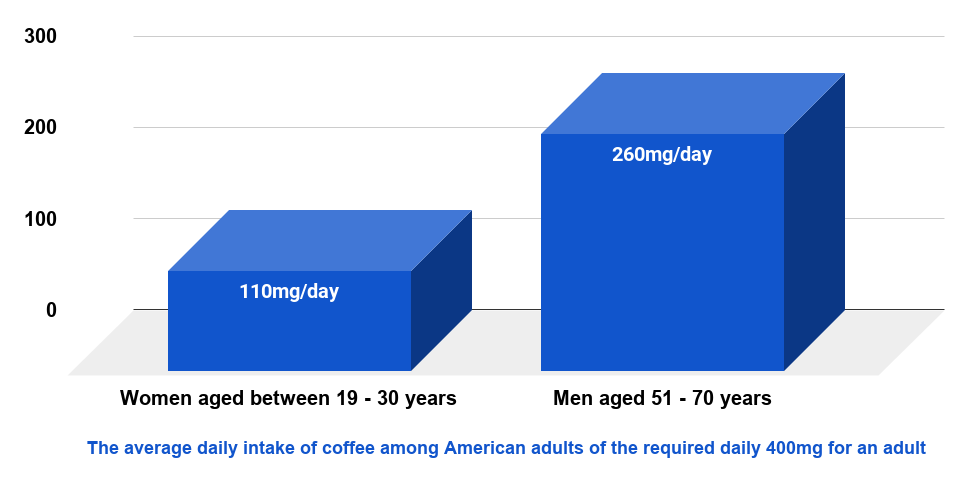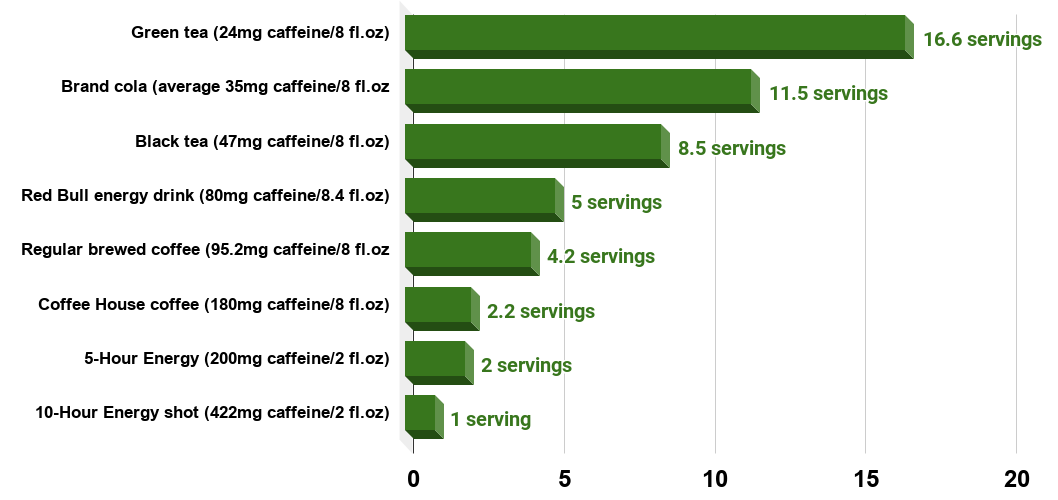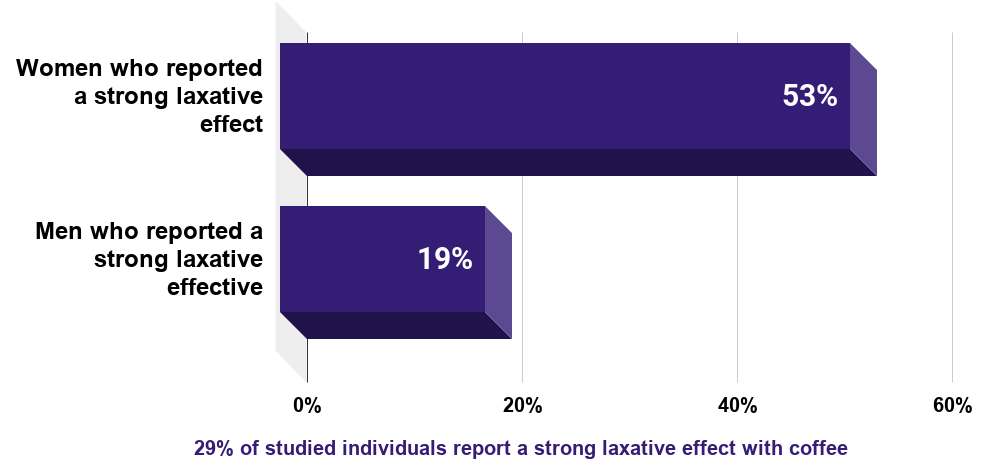What Happens if You Drink Too Much Caffeine
WhatToGetMy Instructional Article
- Taken in moderation and the right quantities, coffee is not bad for your health. However, when you take too much caffeine per day, you expose yourself to the harmful effects of caffeine which comes about as a result of an excessive caffeine intake.
- This article covers the questions of how much caffeine is too much and the effects of too much coffee on the body.
85% of Americans consume caffeine everyday and 70-90% of that caffeine comes from tea and coffee. Source: National Consumers League
We consume caffeine a lot more than we realize because it is present in a whole lot of food items than we take note of. And in most cases, food producers do not disclose the caffeine content in what they produce, and this increases the risk of caffeine overdose.
Caffeine is a natural stimulant that appears in over 60 plants. Its effect is to act as an energy booster. The most popular beverages where we find caffeine are tea and coffee, which account for 90% of the caffeine content that 85% of Americans consume according to the above chart. Other sources of caffeine are soda, some pills, and energy drinks. Any drink, pill, or food item that claims to have an energy-boosting effect contains caffeine.
Is too much caffeine bad for you? That is the question we hope to answer in this article.
How much caffeine is bad for you and how much caffeine should you have a day?
According to experts, the amount of caffeine that should be consumed each day by an adult should not exceed 400 milligrams. The experts have also said that anything above 400 milligrams is excess caffeine and is extremely dangerous for one’s health.
You may read this and think that 400 milligrams are a lot and that you may not exceed it in a day. But you would be surprised at how quickly you can exceed 400mg if you are not careful and intentional about how much caffeine you consume a day. Take a look at a breakdown of the 400mg on this chart below (information gotten from the National Consumers League)
How much servings of popular beverages constitutes the required daily 400mg caffeine intake for an adult. Source: National Consumers League
From that breakdown, you can see that once you take 2 cups of a 15oz sized coffee cup, you’ve already reached the daily limit of 400mg. If you then decide to add maybe a bottle of cola to that equation coupled with maybe black tea or an energy drink, you can see that you’ve already exceeded the daily limit and are almost close to doubling it. If you love espressos or energy shots, you will definitely exceed the daily limit once you take more than one shot. And this becomes a serious health risk to you.
It is therefore important that you are aware of how much caffeinated product you are consuming a day and in what quantities you are consuming them. This is because without keeping a tab on it in this way, you run the risk of overdosing on caffeine without realizing it, given that caffeine is present in a whole lot of other food items aside from coffee and tea.
When it comes to persons like adolescents and children, it has been strongly advised that they should as much as possible limit the taking of caffeine. This is because the stimulating effect of coffee may not be good for their system at a young age and may pose a greater health risk to them. It is therefore important to limit the soda intake of children and adolescents because soda also has a moderately high level of caffeine when consumed in large quantities. Beverages like tea and energy drinks too should be kept at a minimum with children and adolescents.
Pregnant women and women who are trying to conceive are also advised to limit their daily caffeine intake. Pregnant women especially can expose their unborn child to fetal complications if they have a high amount of caffeine in their bloodstream. To err on the side of caution, pregnant women are advised by the experts to limit their daily caffeine intake to 250 milligrams.
To help you cut back on your caffeine intake, we have a very helpful article on What is a good substitute for caffeine. This article contains very healthy and yet stimulating caffeine substitutes that are a better alternative to caffeine. Check it out and cut back on your caffeine intake, while still enjoying all the benefits that caffeine comes with.
You will also like this related article on How does caffeine affect weight loss.
What can too much caffeine do to your body? 15 Symptoms of caffeine overdose, side effects of too much caffeine, and the harmful effects of caffeine.
Caffeine when taken by adults in the right quantities is not bad for your health. It has several health benefits like keeping you stimulated and energized. But only in the right quantities. There are however disadvantages of caffeine when taken in excess quantities. Too much caffeine can have terrible and harmful side effects on your body such as heart palpitations and the likes.
Once you start feeling any of these 15 symptoms and side effects, you should take note that you have a caffeine overdose in your system. Some of these symptoms may even occur when you have not reached the daily 400mgs. And this is because you might be sensitive to caffeine since you don’t take it a lot or your system just doesn’t like caffeine.
1. Heart palpitations.
Caffeine brings about stimulation but when taken in large doses, it can bring about overstimulation. And when overstimulated, your heart can begin to beat rather too quickly, and this will lead to heart palpitations. For persons who are sensitive to caffeine, this may even happen with as little as 100mgs of caffeine.
Whatever the case, once you notice an increase in your heart rate/heartbeat, it is advisable to reduce your intake of coffee because a fast heartbeat is the fastest way to a heart attack or cardiac arrest.
2. High blood pressure.
When you are overstimulated as a result of a caffeine overdose, this can cause your blood pressure to shoot up and become uncomfortably high. This is because when overstimulated you can become very excited and restless, and these are two ingredients for increased blood pressure. If you already have a pre-existing high blood pressure condition, consider limiting your usual intake of caffeine to avoid exacerbating your blood pressure.
3. Jitters and shaking.
In addition to high blood pressure, you may find yourself shaking and having slight tremors and jitters as a result of the restlessness brought about by the overstimulation caused by an excessive intake of caffeine.
4. Irritability.
Caffeine overdose has also been said to make one easily irritable and annoyed easily. This could very well be because when caffeine deprives you of sleep for long periods, you tend to get irritated easily due to the lack of sleep. Sleep deprivation is known to cause easy irritation, and since caffeine helps with sleep deprivation, it is no surprise that being easily irritated is a side effect and symptom of caffeine overdose.
5. Being anxious.
Having an excess amount of caffeine in the body can also lead to anxiety. This can especially be heightened if you took caffeine to give you the energy to finish a deadline. In pumping you with the needed adrenaline, you also find yourself on edge and anxious from the momentary high that comes about from the caffeine.
You will also notice that in addition to being anxious, your heart rate will quicken and you will shake slightly and have jitters all at the same time. With all these symptoms taking place all at once in your body, you expose your nervous system to a dangerous overload that would endanger your health.
6. Gastric reflux which can lead to diarrhea.
Caffeine, especially in coffee, is a laxative that can cause bad gastric reflux when taken in excess quantities. According to one survey seen on Clear Vue Health and shown below, as much as 53% of women reported a strong laxative effect from coffee.
Coffee + bowel movements. Source: Clear Vue Health
What caffeine does is stimulate bowel movement which can cause soft stool. And this is why when taken in large doses it can cause diarrhea.
7. Insomnia.
Its ability to keep people awake is the chief reason why so many people consume caffeine, especially in coffee. But this can be harmful when taken in excessive quantities or at the wrong time.
It has been found that taking caffeine, especially coffee in the afternoon, can cause a person not to sleep at night because the effect stays in the body sometimes as much as 9 hours.
And when you consistently do not have a good night’s rest, this will affect your productivity and lead to other symptoms especially fatigue, heart palpitations, anxiety, and jitters.
8. Fatigue.
What happens when your body is stimulated and energized for the moment when you’re on a caffeine high, is that once that high wears off, fatigue sets in. This is the body’s natural way of resetting itself back to normal.
But what some people resort to doing is to kind of override this natural process by pumping themselves with more caffeine to keep the energy going. This is dangerous for your health because it would keep the fatigue stored up and when it eventually kicks in, you may not be able to handle the onset of fatigue because it would leave you very weak.
9. Excessive urination.
This is another effect of excessive caffeine. And this happens due to the stimulating effects of caffeine on the bladder. It also happens because one of the other effects of caffeine is to make you very thirsty. Your constant intake of water means your bladder is always full and working on overdrive. This would lead you to always need to empty your bladder. For persons with an existing urinary condition, it would only make it worse.
10. A throat that is easily dry and thirsty.
Caffeine dries up your throat very easily and means you will be more thirsty than normal. And when you are always filled up with water you will find yourself having to frequent the restroom to empty your bladder, aka excessive urination.
11. Addiction and withdrawal symptoms.
Caffeine addiction is not exactly the same as drug addiction, but make no mistake, it can become addictive. What caffeine does is to give you a quick adrenaline rush that gets you to be productive and energetic. And it is very easy to get hooked on this effect. It won’t be long before you realize that you are now dependent on it for your quick rush and energy boost.
What then happens when you become addicted to coffee in this way is that once you decide to stop completely, you will experience withdrawal symptoms like headaches, anxiety, and easy irritability.
To avert the addiction and the withdrawal symptom that comes with it from happening, it is best to start early enough to check your intake and limit it as much as possible.
12. Headaches.
The other symptoms of caffeine overdose such as anxiety and fatigue can also lead to headaches. Once you notice an increase in headaches after you take caffeine, that is your body’s way of telling you to cut back because it is now on the side of overdose.
13. Hallucinations, seizures.
Caffeine overdose also makes one prone to hallucinations and seizures. These come about because of the negative effect of caffeine on the nervous system due to the overdose.
14. A cardiac arrest in very bad cases.
Heart palpitations, high blood pressure, and seizures, when left unchecked are recipes for a cardiac arrest. If you keep having these symptoms and ignoring them and continue with the caffeine overdose, a cardiac arrest is only a matter of time before it happens.
Protect your health and avert an unplanned trip to the emergency room by cutting back on your caffeine intake.
15. Too much caffeine can lead to death in some cases.
This is a grave and chilling reality of what a caffeine overdose can lead to. Imagine that you have a cardiac arrest as a result of caffeine and you are alone with no one in sight to quickly take you to the emergency room/hospital. It is not rocket science that the delay in arresting that cardiac arrest will lead to an automatic death.
This possibility alone should be enough to cause a rethink on just how much caffeine we are introducing into our system. You have only one life. Do not cut it short by a stubborn adherence to excessive caffeine even when you now know that it is dangerous for your health.
In addition to caffeine substitutes, being full, on other healthy food items can help you reduce your caffeine intake. Read our helpful article on What foods should we eat to maintain a healthy lifestyle to get helpful insights on healthy food alternatives to fill up on.
Frequently Asked Questions.
1. Does caffeine cause muscle cramps?
Yes, caffeine causes muscle cramps. This is because too much caffeine can cause overstimulation which can also affect your muscles. This will cause your muscles to begin to twitch, and this will in turn lead to muscle cramps.
2. Is too much caffeine bad for you?
Yes indeed, too much caffeine is bad for you. It will cause you the 15 symptoms and side effects listed in this article.
3. Can too much caffeine make you sick?
Yes, too much caffeine can cause diarrhea and also headaches. Any of these two can make you very sick.
4. Can too much caffeine make you tired?
Yes, too much caffeine can bring an onset of fatigue/extreme tiredness.
5. How much caffeine is too much?
Anything above 400mg a day is too much caffeine. Monitor the amount of caffeine you take by monitoring the quantity of caffeine-containing beverages you consume daily.
6. Can you flush caffeine out of your system?
Yes, you can do so naturally by completely cutting back on your caffeine intake for some time and replacing it with lots of water.
If however, you are facing a life-threatening condition like a cardiac arrest due to caffeine overdose, the hospital can use their specialized processes to flush it out of your system.
If you want to flush it out medically, you can also go to a hospital and ask them about the procedure and have them carry it out on you.
7. What happens if you drink too much coffee in a day?
You expose yourself to all or some of the 15 risk symptoms discussed in this article and it is not worth it. Pace your daily intake by keeping a tab on the caffeine beverages consumed each day.
In Conclusion.
Too much caffeine is bad for your health. The health risks it exposes you to are not worth it. It is not too difficult keeping a tab on your daily caffeine intake. Now that you know the caffeine content in each beverage and how much of each is needed to make up the recommended daily 400 mg, be intentional about how much of these beverages you consume daily.
The last thing you want is to have a food substance like caffeine substantially reduce your quality of life and your life longevity.
01 HOUR 16 MINUTES
ESTIMATED TIME DESIGNING AND UPLOADING THIS ARTICLE
06 HOURS 30 MINUTES
ESTIMATED TIME RESEARCHING AND WRITING THIS ARTICLE
You Might Also Like

6 Benefits of Breathing Through the Nose While Running
6 Benefits of Breathing Through the Nose While Running WhatToGetMy Instructional Article We all know that nasal breathing is better than mouth breathing in general but is it the same while you’re exercising? Are there more benefits of breathing through the nose while running? Sure cardio

How to Become a Runner When You Hate Running?
How to Become a Runner When You Hate Running? WhatToGetMy Instructional Article There isn’t only one answer to the question “How to become a runner when you hate running”. We need to dig a bit deeper to solve this one. For starters, most people hate

How Does Caffeine Affect Weight Loss?
How Does Caffeine Affect Weight Loss? WhatToGetMy Instructional Article How does caffeine affect weight loss? Is drinking coffee preventing you from losing weight or does caffeine cause weight loss? We’ll try to tackle these questions in this article. Naturally, we’ll start by talking about caffeine

25 Weight Lifting Gift Ideas For Powerlifters And Weightlifters
Powerlifters and weightlifters have specific clothing needs which you may be unaware of, and this is why buying them powerlifting training gear is not advisable. The best gifts are powerlifting equipment and accessories and some personalized and funny gifts. Our gift list of 25 Weight

What Foods Should We Eat to Maintain a Healthy Lifestyle?
What Foods Should We Eat to Maintain a Healthy Lifestyle? WhatToGetMy Instructional Article If you’re wondering what foods should we eat to maintain a healthy lifestyle, just keep scrolling. We discussed diet and its relation to an active lifestyle. A healthy diet is about finding

Fitness Activities for Elementary Students
Top Fitness Activities For Elementary Students WhatToGetMy Instructional Article Are you a parent that is looking for elementary fitness activities that they can do at home? Do you feel like your kids don’t do enough activities at school or you are looking for something to

9 Signs of a Cold Hearted Person
Signs of a Cold Hearted Person WhatToGetMy Instructional Article Cold hearted people are generally that way for the 3 reasons we explain in this article. Why not read on to find out what they are. If you want to know if you are dealing with

How Can We Protect Our Health and Lengthen Our Lives?
How Can We Protect Our Health and Lengthen Our Lives? WhatToGetMy Instructional Article We were wondering how we can protect our health and lengthen our lives, so we started researching this topic. There are a lot of things we found out and we decided to

How to Get Motivated to Exercise When You’re Depressed?
How to Get Motivated to Exercise When You’re Depressed? WhatToGetMy Instructional Article Let’s start by underlining that depression is a serious illness that causes a persistent feeling of sadness and loss of interest. The best way to help yourself is to talk to a therapist.

What is a Good Substitute For Caffeine?
What is a Good Substitute For Caffeine? WhatToGetMy Instructional Article If you’ve wondered what is a good substitute for caffeine, we have interesting choices to present. It’s not that we don’t like coffee (or tea). On the contrary, we love coffee! However, too much caffeine





